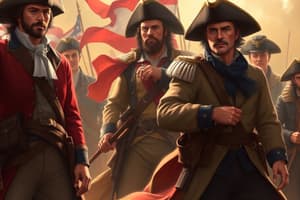Podcast
Questions and Answers
What was the significance of the Treaty of Paris (1783)?
What was the significance of the Treaty of Paris (1783)?
- It introduced a unicameral legislature to the colonies.
- It recognized American independence and established borders. (correct)
- It formally ended the Southern Campaign of the British.
- It was the first agreement made with the Iroquois Confederacy.
Which battle is known for marking a turning point in the Revolutionary War and convincing France to form an alliance with the Americas?
Which battle is known for marking a turning point in the Revolutionary War and convincing France to form an alliance with the Americas?
- Battle of New York
- Battle of Yorktown
- Battle of Charleston
- Battle of Saratoga (correct)
What was one of the major issues leading to Shays’s Rebellion?
What was one of the major issues leading to Shays’s Rebellion?
- Disputes over trade with Spain.
- The establishment of the Articles of Confederation.
- Tax and tariff controversies affecting farmers. (correct)
- A demand for independence from the Iroquois Confederacy.
Who played a significant role as a commander in the Battle of Charleston during the British Southern Campaign?
Who played a significant role as a commander in the Battle of Charleston during the British Southern Campaign?
What document established a unicameral legislature asserting national sovereignty in the early days of the United States?
What document established a unicameral legislature asserting national sovereignty in the early days of the United States?
What was the primary goal of Lord Dunmore’s Proclamation during the American Revolutionary War?
What was the primary goal of Lord Dunmore’s Proclamation during the American Revolutionary War?
What was a significant consequence of the Battles of Trenton and Princeton for the Continental Army?
What was a significant consequence of the Battles of Trenton and Princeton for the Continental Army?
Which event directly influenced the surrender of Lord Cornwallis at Yorktown?
Which event directly influenced the surrender of Lord Cornwallis at Yorktown?
Which group was primarily involved in the western campaigns against the British during the Revolutionary War?
Which group was primarily involved in the western campaigns against the British during the Revolutionary War?
What issue was central to the Newburgh Conspiracy among Continental Army officers?
What issue was central to the Newburgh Conspiracy among Continental Army officers?
Flashcards
Hessians
Hessians
German troops hired by the British to fight in the American Revolutionary War.
Battle of Saratoga
Battle of Saratoga
Turning point of the American Revolution; French alliance resulted.
Articles of Confederation
Articles of Confederation
First US government; weak central authority; unicameral legislature.
Shays's Rebellion
Shays's Rebellion
Signup and view all the flashcards
Yorktown Campaign
Yorktown Campaign
Signup and view all the flashcards
Lord Dunmore's Proclamation
Lord Dunmore's Proclamation
Signup and view all the flashcards
Evacuation of Boston
Evacuation of Boston
Signup and view all the flashcards
Battle of Charleston
Battle of Charleston
Signup and view all the flashcards
French Alliance
French Alliance
Signup and view all the flashcards
Treaty of Paris (1783)
Treaty of Paris (1783)
Signup and view all the flashcards
Study Notes
Key Events and Figures of the American Revolution and Early Republic
- Lord Dunmore's Proclamation: Offered freedom to enslaved people who joined the British forces.
- Hessians: German troops hired by the British to fight in the American Revolution.
- Ethiopian Regiment: A unit of African American British soldiers.
- Evacuation of Boston: British troops left Boston in 1776.
- Battle of New York: British victory, crucial loss for the Continental Army.
- Battles of Trenton and Princeton: Critical American victories, boosted morale and showed the army's effectiveness.
- Battle of Saratoga: Turning point in the war, crucial American victory that convinced France to form an alliance.
- Benedict Arnold: American general who betrayed the Continental Army.
- French Alliance: France allied with the Americans, providing crucial support.
- Valley Forge: Winter encampment where the Continental Army suffered greatly but trained and endured.
- British Southern Campaign: British strategy focused on controlling the South, attempting to gain support to the loyalists in the area.
- Battle of Charleston: Major British victory, severely weakening American forces in the South.
- George Rogers Clark: Led campaigns in the Western territories, claiming territory for the American colonies.
- Western Campaign: Efforts to gain control of territories west of the Appalachian Mountains.
- John Paul Jones: Crucial American naval hero, instrumental in naval battles.
- Bon Homme Richard vs. Serapis: Famous naval battle with John Paul Jones.
- Francis Marion: Known as the "Swamp Fox," a skilled Southern guerrilla leader.
- Nathaniel Greene: Commanded Southern forces and effectively fought the British.
- Lord Cornwallis: British general who surrendered at Yorktown.
- Yorktown Campaign: Series of operations culminating in the decisive British defeat at Yorktown.
- Washington/Lafayette: Key figures in the Yorktown campaign, crucial for the American victory.
- Cornwallis's surrender: Marked a major turning point, signifying British defeat.
- Treaty of Paris (1783): Ended the American Revolution, recognized American independence.
- Franklin, Adams, Jay: American diplomats who negotiated the Treaty of Paris.
- Loyalists: Americans who remained loyal to the British crown.
- Articles of Confederation: First governing document of the US, a unicameral legislature.
- Iroquois/Western Confederacy: Native American groups who fought on both sides of the war.
- Chief Joseph Brant: Iroquois leader who sided with the British.
- Creditors' claims: Financial disputes over debts.
- Trade issues/boycotts/closed ports: Economic struggles due to British restrictions.
- Western lands disputes: Conflicts over territories west of the Appalachian Mountains.
- Tax and tariff controversies: Economic issues raised during the early years of the republic.
- Newburgh Conspiracy: Military unrest concerning payment issues (pay).
- Spain and the right of deposit: Spanish control over the Mississippi and New Orleans, creating issues for American trade.
- Rhode Island and paper currency: Economic instability in Rhode Island related to paper currency.
- Shays's Rebellion: Armed uprising by farmers against economic hardships.
- Annapolis Convention: Early attempt to address interstate issues, did not achieve a quorum.
Studying That Suits You
Use AI to generate personalized quizzes and flashcards to suit your learning preferences.
Description
Test your knowledge on the pivotal events and important figures of the American Revolution and Early Republic. This quiz covers significant battles, alliances, and individuals that shaped the course of American history. Explore topics like Lord Dunmore's Proclamation, the Battle of Saratoga, and the impact of the French Alliance.




